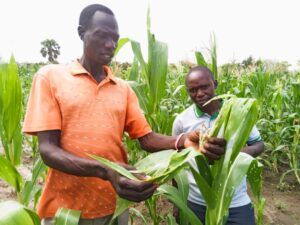 Stories
Stories
May 15, 2023 • 2 min read
Joseph Ogwang is a 39-year-old farmer in Lira Palwo sub-county in Agago District, Uganda. For many years, he practised subsistence farming as means of supporting his family. He mainly grew maize, beans and cassava on his 2-acre piece of land.
Livelihood in peril
“My maize garden, which used to produce over five bags at a time, began to reduce, and so did the beans that I would inter-crop. This affected my income and threatened the food security in my home as my children were at risk of suffering from malnutrition,” recalled Ogwang.
Ogwang is a husband and father of six children. In recent years, changing weather patterns have allowed pests and insects to thrive, and eventually led to a reduction in his seasonal yields. Ogwang and the other farmers tried to use traditional herbs to kill the pests, but they kept on increasing and making the crops wither. They were unable to rescue many of the crops that were adversely affected, with the leaves drying and falling off one by one.
“I was always devastated seeing my efforts go to waste. My family and I lost hope of ever getting good yields from our farming activities,” he said, sadly.
Nutrition Impact Positive Practice (NIPP)
After several years, Ogwang was eventually helped through his participation in GOAL’s Nutrition Impact Positive Practice (NIPP) approach, which was implemented under USAID’s ‘Feed the Future’ One Nutrition in Complex Environments (ONCE) project.
Through the NIPP approach, participants from two nearby villages were mobilised in three groups, with 15 members each – which comprised 15 men, 15 women, and 15 community leaders. They received Social Behavioural Change Communication (SBCC) messaging around nutrition and were taught how to grow better-yielding foods on their small pieces of land.

Since 2021, the project has trained farmers like Ogwang on effective agricultural techniques using upcycled local materials. Farmers have also been trained in spacing and the best crop species for the area. This education is helping farmers like Ogwang pick up the pieces and look towards a brighter future of abundant yields, which will allow them to be food secure and earn an income.
Ogwang says that ever since he received the training, he’s been implementing what he was taught and has seen an improvement in his garden.
He says that after several consultations, he decided to plant ‘Bazooka,’ a new maize variety that gives hope to farmers facing climate change-related drought or MNL, a devastating maize disease.
“I now expect to harvest more than seven bags during this second season. This will enable me to have some income to support my children in school as well as have some sufficient food to feed them.”
Ogwang now applies fertilisers and continuously monitors his garden for pest invasions. When he does encounter pests, he immediately takes action to prevent them from spreading to other plants in his garden. Ogwang has also supplemented his family’s diet by planting vegetables around his compound. However, he still encounters challenges accessing input dealers in his area, as the nearest shop is over 100 kilometres away. He says having the input dealers closer to the farmers will enable them to save on transport and the distance they cover.
